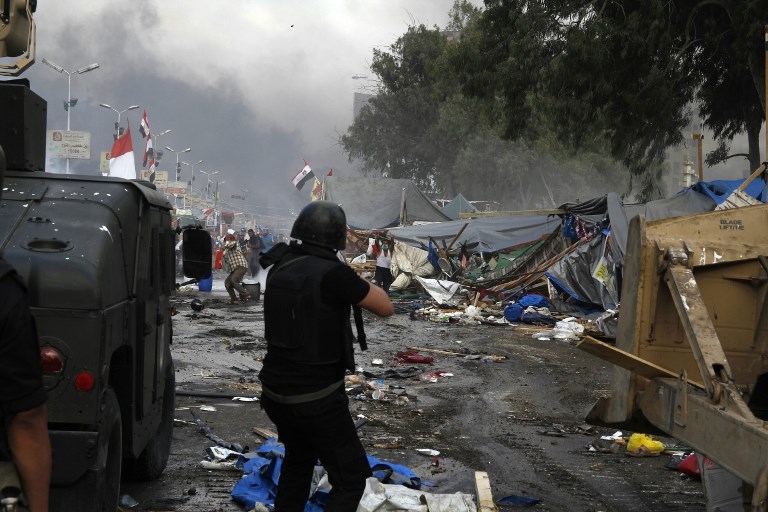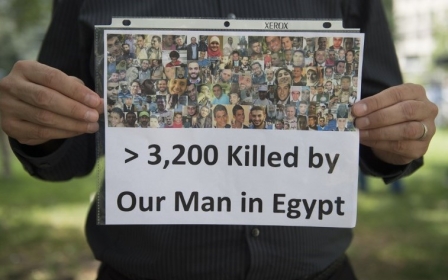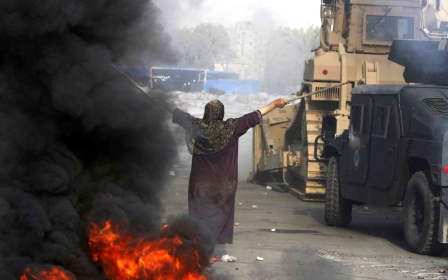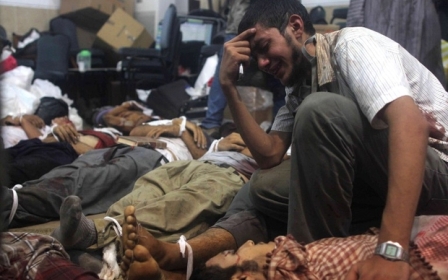Amnesty slams 'disgraceful' mass trial as 75 sentenced to death in Egypt over Rabaa protest

An Egyptian court has sentenced 75 people to death, including several Muslim Brotherhood leaders, over their participation in a sit-in in 2013 in support of the deposed president Mohammed Morsi that was violently repressed by security forces and ended with the killing of hundreds of protesters.
Those found guilty on Saturday were among more than 700 defendants on trial for allegedly killing policemen and vandalising property during the protests in Cairo's Rabaa al-Adawiya and Nahda squares.
Amnesty International condemned the series of sentences, which also included 47 life sentences and heavy prison sentences for another 612 people, as "disgraceful".
The 75 death sentences were originally passed by the Cairo Criminal Court in July and Saturday's confirmation of them, as well as the other verdicts, marks the end of the trial.
Prominent members of the now-banned Muslim Brotherhood organisation, including its spiritual leader Mohammed Badie, were among those sentenced to life, judicial sources said.
Award-winning photojournalist Mahmoud Abu Zeid, widely known as Shawkan, who was arrested for taking photos at the protests, was sentenced to five years in prison.
Shawkan, who received UNESCO's Press Freedom Prize in May, was accused of "murder and membership of a terrorist organisation".
The charges can carry the death penalty but should be able to walk free after already having spent five years in jail.
Shawkan should be able to leave prison "within a few days," his lawyer Karim Abdelrady said as he welcomed the verdict, the AFP news agency reported.
But the lawyer added that the sentence was nevertheless "unfair because he was only doing his job" and covering the events unfolding in the Egyptian capital five years ago.
Press freedom group Reporters Without Borders (RSF) secretary-general Christophe Deloire said the organisation was "immensely relieved" to hear of Shawkan's imminent release.
'Mockery of justice'
RSF ranks Egypt 161st out of 180 countries on its press freedom index and says that at least 31 journalists are currently detained in the Arab world's most populous nation.
"The Egyptian authorities should be ashamed," Najia Bounaim, Amnesty International's North Africa campaigns director, said in a statement.
"The fact that not a single police officer has been brought to account for the killing of at least 900 people in the Rabaa and Nahda protests shows what a mockery of justice this trial was."
On 14 August 2013, one of the bloodiest days in Egypt's modern history, police moved to disperse the sprawling protest camp at Rabaa a month after the army deposed the democratically elected Morsi from office.
More than 800 people were killed within hours at Rabaa al-Adawiya and the capital's Nahda Square, where another sit-in was being held.
The Egyptian government, now led by President Abdel Fattah el-Sisi, said many demonstrators were armed and 43 police officers were killed.
Hundreds more people were killed in street clashes with police over several months after the August massacre and mass arrests were carried out.
Global rights groups Amnesty International and Human Rights Watch say at least 40,000 people were arrested within the first year after Morsi's removal.
Egypt's courts have sentenced hundreds of people, including Morsi and several leaders of his Brotherhood movement, to death or lengthy jail terms after speedy mass trials.
Many have appealed and won retrials, but 26 executions have been carried out.
New MEE newsletter: Jerusalem Dispatch
Sign up to get the latest insights and analysis on Israel-Palestine, alongside Turkey Unpacked and other MEE newsletters
Middle East Eye delivers independent and unrivalled coverage and analysis of the Middle East, North Africa and beyond. To learn more about republishing this content and the associated fees, please fill out this form. More about MEE can be found here.




